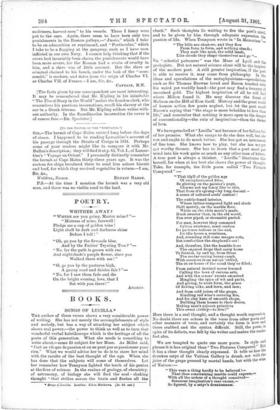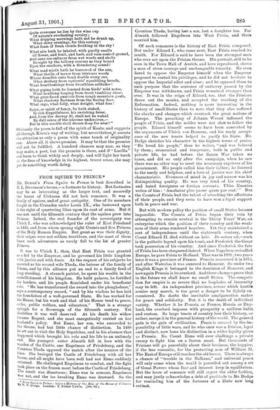BOOKS.
SONGS OF LTJCILLA.*
THE author of these verses shows a very considerable power of writing. She has not merely the accomplishments of style and melody, but has a way of attacking her subject which shows real power,—the power to think as well as to turn that wonderful verbal kaleidoscope which is the heritage of all the poets of this generation. What she needs is something to write about,—some fit subject for her Muse. As Millet said, " l'art ne vit que de passion et on ne peut pas se passionner pour rien." What we would advise her to do is to store her mind with the results of the best thought of the age. When she has done that the subjects will come of themselves. Let her remember how Tennyson lighted the torch of his genius at the fires of science. In the realms of geology, of chemistry, of astronomy, of biology she will find the soul - shaking thought " that strikes across the brain and flushes all the • Bongs of Lucilta. London: Elkin Mathews. [Ss. 6d. net.] cheek." Such thoughts lie waiting to fire the poet's mild, and to be given by him through adequate expression the passion of life. When Tennyson wrote in "In Memoriam"...
" The hills are shadows, and they flow From form to form, and nothing stands ; They melt like mist, the solid lands, Like clouds they shape themselves and go "—
his " celestial patroness " was the Muse of Lyell and the geologists. Bnt not natural science alone will be the inspires of the modern poet. A still greater inspiration, it the pod is able to receive it, may come from philosophy. In the ideas and speculations of the metaphysicians—speculations such as Sir Thomas Browne loved and Bacon touched with his weird yet worldly hand—the poet may find a treasury of uncoined gold. The highest inspiration of all he will find where Milton found it. He may discover the fount of Helicon on the Hill of Zion itself. History and the great world of human action few poets neglect, but let the poet recall Bacon's saying that "the stage is more beholden to love than life," and remember that nothing is more open to the danger of conventionality—the ruin of inspiration—than the theme
of love.
We have preached at " Lucilla " not because of her failure,tu:, of her promise. What she essays to do she does well, but she can and ought to do much better. She has got an instrument of fine tone. She knows how to play, but she has not yet got worthy themes. She has to learn that a poet must put mind into his work quite as much as any other man of letters. A true poet is always a thinker. " Lucille.," illustrates this herself, for when at her best she shows the power of thought Take, for example, the little poem called " Two Pictures Compared" :-
" That idyll of the golden age Of unsophisticated bliss,
So glowing on the painter's page, Charms not my fancy like to this, That from it's sprung—by long descent A scene of cultured souls' content !
The subtle-toned interior, Whose lattice-tempered light and shade Shift mutely, on the marble floor, While on the viols music's made, Much sweeter than, in the old world, Pan ever piped, or streamlet purled.
For men, however they commend Sylvan existence, must confess Its pa.tirnes tedious in the end, Its idle hours a weariness,
And, sounding still some meagre note, But comfortless the shepherd's oat !
And, therefore, like the humble-bees The sugared drops that carry home To furnish, by and by, from these The nectar-oozing honey-comb, With essences from nature 'stilled, The store-house of the mind they've filled; From natural instinct never learned
Calling the laws of curious arts, And with the senses' sweets unearned
Mingling the spice of wit and pasts, And giving, to nude form, the grace Of flowing silks, and lawn, and lace; And from cold juices of the grape, Kindling red wine's reviving fire, And for clay huts of uncouth shape,
Building them homes to their desire, Making man's sojourn primitive This sweet civility—to live!"
Here there is a real thought, and a thought worth expression No doubt there are echoes in the verse from other poets and other manners of verse, and certainly the form is here and there crabbed and the syntax difficult. Still, the poem, in spite of its defects, was felt by the writer and makes the reader
feel also.
We are tempted to quote one more poem. In style and phrase it is less original than " Two Pictures Compared. But it has a clear thought clearly expressed. It tells us how the drunken satyr of the Vatican Gallery is drunk, not with the juice of the grape pressed by mortal hands, but with the wine of Nature :— " This were a thing hardly to be believed!— That thus constraining marble could express: With all the ardour of a thought conceived—
Sensuous imagination's rare excess,— So figured, by a satyr's drunkenness. Quite overcome he lies by the wine cup Of nature's everlasting revelry; What dripping mornings bath not he drunk up,
What dewy evenings, for this ecstasy!
What foam of fresh clouds frothing in the sky !
What airs bath he inhaled, with goodly smells Of flower, and fruit, and herb, and rain-soaked ground, And sane sea-saltness from wet weeds and shells Brought by the billowy courses as they bound Upon the seashore, with a thundering sound!
What mad mirth bath he borrowed of the sun, What thrills of terror from intricate woods Where dwarfish oaks bend double every one, What drollery from squirrels' squabbling broods, What heartbeatings from breathless solitudes !
What piping hath he learned from birds' wild notes, What headlong leaping from trout tumbling sheer, What grim-faced gambols from rough mountain goats, What shadowy fleetness from the fleeing deer, What rage, what folly, what delight, what fear !
Satyr, or spirit of fancy, he bath slaked,
In rich forgetfulness, his ravishing fever, And, from the drowsy at, shall not be waked
By dull sense of the irksome undeceiver,— But in this marble shall dream deep for ever!"
Obviously the poem is full of the spirit of Beats, and suggests all through Keats's way of writing, but neverthelessjt arrests the attention as only a poem with some touch of originality can. Above all, it shows promise. It may be that the promise will not be fulfilled. A hundred chances may mar, as they may make, a poet, but the promise is there, and if " Lucilla" can learn to think widely and deeply, and will light her torch at the fires of knowledge in its highest, truest sense, she may yet do something worth doing.



































 Previous page
Previous page